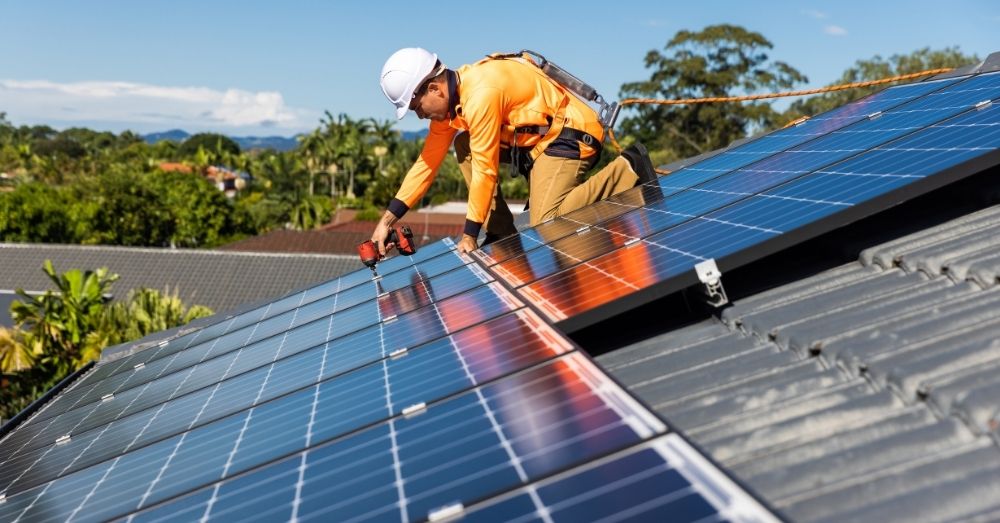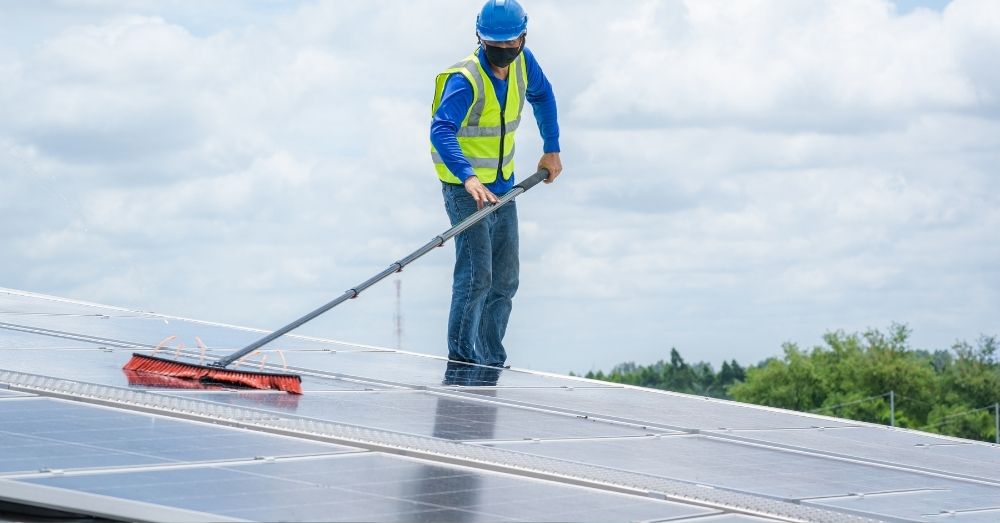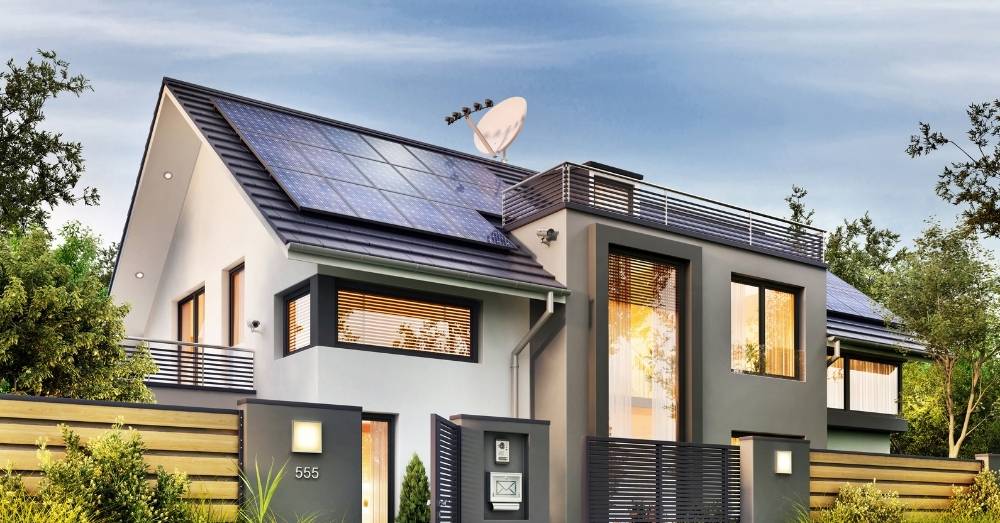
Table of Contents
Key Takeaways
✔ Compare all costs, including equipment, labor, and any hidden fees, while reviewing available payment options.
✔ Choose panels with proven efficiency, durability, and a strong performance history.
✔ Confirm a clear installation timeline from contract signing to system activation.
✔ Understand the details and duration of product, performance, and workmanship warranties.
✔ Clarify who is responsible for maintenance, repairs, and response times.
✔ Ask about available tax credits, rebates, and incentives to lower the total cost.
✔ Review the expected yearly energy output to ensure it matches the household’s needs.
✔ Check past customer experiences and references to confirm the company’s reliability.
The solar industry continues to grow as more homeowners and businesses look for ways to save on energy costs while reducing their environmental impact. In the United States, the solar market installed 10.8 gigawatts direct current (GWdc) of capacity in Q1 2025, making it one of the strongest quarters in the industry’s history. However, with so many options and providers available, making the right choice can feel overwhelming for the average consumer.
Here are eight questions to ask solar companies to ensure the best investment.

Top 8 Questions to Ask Solar Providers
1. What Is the Total Cost and Payment Structure?
Understanding the total cost is one of the most important questions to ask solar companies before signing any agreement. It helps ensure there are no surprises later and gives a clear picture of the overall investment. This includes not only the panels themselves but every cost tied to getting the system up and running.
Break Down the Costs
Asking for a detailed breakdown allows homeowners to see exactly where their money is going and compare options from different providers when learning how to pick a solar company.
- Installation Costs: The price for setting up the solar panels, wiring, and mounting hardware on the home.
- Equipment Costs: The cost of solar panels, inverters, batteries (if included), and any monitoring systems.
- Labor Costs: Payment for the professionals handling the installation, electrical connections, and inspections.
- Hidden Fees: Possible extra charges such as permit fees, inspection costs, or utility connection fees that are not always included in the first quote.
Understand Payment Options
Choosing the right payment option is just as important as knowing the price. Discussing these early helps in making the best financial choice and is a key step in how to choose a solar company.
- Purchase: Paying for the system upfront, often leading to the greatest long-term savings and full ownership.
- Loan: Financing the system through monthly payments, allowing ownership while spreading out the cost.
- Lease: Paying a set monthly fee to use the system without owning it, which may have lower upfront costs but fewer long-term savings.
2. What Type and Brand of Solar Panels Will Be Installed?
It is important to know exactly what type and brand of solar panels will be installed on a property. This helps determine how well the system will perform, how long it will last, and whether it is worth the investment. When thinking about questions to ask solar companies, this should be near the top of the list.
Panel Efficiency
Efficiency measures how well a solar panel can turn sunlight into electricity. Choosing panels with higher efficiency can mean more energy in less space, which is important for smaller roofs.
- Higher Efficiency Rate: Produces more electricity in the same amount of sunlight, helping to maximize energy output. This can be especially useful in areas with limited sunny hours or where energy demand is high.
- Better Space Use: Ideal for homes with limited roof area since fewer panels are needed to meet energy needs. It also allows room for potential system expansions in the future.
- Long-Term Value: Can increase savings over time by producing more energy without needing extra panels. Over the years, this can significantly reduce reliance on grid power.
Performance Track Record
Looking into how a brand’s panels have performed over time can prevent future problems. This is one of the most useful questions to ask a solar company before signing a contract.
- Proven Reliability: Shows the panels work well in real-world conditions, not just in controlled lab tests. Reliable performance means fewer breakdowns and better long-term results.
- Positive Customer Feedback: Offers insight into long-term satisfaction and service quality from real homeowners. Consistent praise from past customers is a strong trust signal.
- Strong Brand Reputation: Indicates the company stands behind its products with quality service and reliable warranties. A reputable brand is more likely to honor commitments years after the purchase.

3. How Long Will Installation Take?
Understanding the installation timeline is an important step when learning how to pick a solar company. The process includes planning, permits, and inspections. This is one of the key questions to ask solar companies to make sure the project fits personal schedules and expectations.
Typical Timeline from Start to Finish
The timeline can vary depending on the solar company, local regulations, and the complexity of the installation. Asking clear questions about solar energy and how the process works will help set realistic expectations.
- Contract Signing to Site Assessment: After signing the contract, the company usually schedules a site assessment within one to two weeks to check the roof, electrical system, and sun exposure.
- Design and Permit Approval: Designing the system and getting permits from the local authority can take anywhere from two to six weeks, depending on how fast approvals are processed.
- Equipment Ordering and Scheduling: Once permits are approved, the company orders equipment and schedules the installation, which may take an additional one to three weeks.
- Panel Installation: The actual installation is often completed within one to three days for most homes, though larger or more complex systems may take longer.
- Inspection and Activation: After installation, an inspection is required before the system can be connected to the grid. This final step can take one to three weeks depending on local scheduling and utility company response times.
Why Timelines Can Vary
When looking into how to choose a solar company, it is helpful to understand why timeframes differ. Asking these questions early in the process ensures fewer surprises later.
- Permit Delays: Some areas have longer approval processes due to local regulations.
- Weather Conditions: Rain or storms can cause delays in installation schedules.
- Equipment Availability: Back-ordered panels or components can slow down the process.
- Inspection Scheduling: The local inspector’s availability can impact when the system is activated.
4. What Warranties and Guarantees Are Offered
When looking at questions to ask solar companies, it is important to understand the warranties they provide. A warranty is a promise from the company or manufacturer to repair or replace something if it fails. Knowing the details can save time, money, and stress later.
Equipment Warranty
An equipment warranty covers the solar panels and other hardware that make up the system. This warranty ensures that the products are free from defects and will work as promised.
- Coverage Period: This explains how long the panels, inverters, and other equipment are protected.
- Defect Protection: This covers replacement or repair if the product fails due to manufacturing issues.
- Replacement Terms: This details whether the company will replace faulty parts at no cost or at a reduced cost.
Workmanship Warranty
A workmanship warranty protects against problems caused by the way the system was installed. This is important because even the best equipment can fail if installed incorrectly.
- Installation Errors: This covers repairs if issues come from mistakes during installation.
- Labor Coverage: This includes the cost of labor needed to fix any installation-related problems.
- Length of Warranty: This states how long the installation work is guaranteed to be problem-free.
Performance Warranty
A performance warranty promises that the solar panels will produce a certain amount of energy over a set period. Asking questions about solar energy production is key to knowing how the system will perform over time.
- Guaranteed Output: This states the minimum power the panels should generate each year.
- Degradation Rate: This explains how much the system’s output can drop over time while still being under warranty.
- Compensation Options: This covers what happens if the panels do not produce the promised amount of energy, such as a refund or replacement.

5. How Will Maintenance and Repairs Be Handled?
One of the most important areas to cover is how maintenance and repairs will be managed after installation. Understanding this ahead of time can help avoid unexpected costs, delays, or confusion later. This is also a key part of knowing how to pick a solar company that will stand by their work and provide reliable support.
Key Responsibilities
Before signing any agreement, it is important to confirm exactly who will handle maintenance and repair needs.
- Installation Company Responsibility: The solar provider handles all repair and maintenance requests directly, which often makes the process faster and more reliable.
- Third-Party Service: Repairs and maintenance are outsourced to another company, which may affect the level of service and communication.
- Manufacturer Support: Some warranties require contacting the panel manufacturer for certain issues, which can involve additional steps.
Expected Response Times
Clear expectations about how quickly service will be provided can prevent long system downtimes.
- Standard Service Window: A set time frame, such as within 3–5 business days, for scheduling repairs or inspections.
- Emergency Response: A faster process for urgent issues, like complete system shutdowns.
- Seasonal Considerations: Adjusted timelines during peak installation seasons when service teams may be busier.
Associated Costs
When asking questions about solar energy, cost transparency is key. Knowing what is included in the service agreement can help in deciding how to choose a solar company.
- Included in Warranty: Maintenance and certain repairs are covered at no extra charge for a set period.
- Service Call Fees: A set charge for each visit if the issue is not covered under warranty.
- Replacement Costs: Clear pricing for parts and labor if repairs fall outside the coverage.
6. What Incentives, Tax Credits, or Rebates Are Available?
Understanding what financial help is available can make a big difference in the total cost of going solar. Many homeowners miss out on savings simply because they do not know about available programs or do not have help applying for them. The right provider should guide a homeowner through every option.
Federal Incentives
A reputable installer should explain what federal programs apply and how to claim them.
- Federal Solar Investment Tax Credit (ITC): The Residential Clean Energy Credit lets homeowners deduct 30% of the cost of new, qualified clean energy systems from federal taxes for installations completed between 2022 and 2032. This credit can greatly reduce the upfront expense of going solar, making the investment more affordable.
- Eligibility Requirements: The company should clarify which system types and installation timelines qualify for these incentives.
State and Local Incentives
Each state and city may have its own benefits, and these can be just as valuable as federal options.
- State Tax Credits: Some states offer additional credits that can be used along with the federal credit for more savings.
- Local Rebates: Cities or counties sometimes give cash rebates for installing solar, which can lower the initial payment amount.
Utility Company Programs
A good provider should also know about any programs run by the local utility company.
- Net Metering: This program allows homeowners to earn credits on their bill for excess energy sent back to the grid.
- Cash-Back Programs: Certain utilities offer direct payments or bill credits for switching to solar energy.
Help With Applications
When considering questions to ask a solar company, it is important to confirm if they will assist with the paperwork.
- Guidance Through Forms: A quality company will help fill out applications for tax credits, rebates, and incentive programs.
- Submission Support: They should also make sure all forms are submitted on time to avoid missing out on benefits.

7. How Much Energy Will the System Produce Annually?
Knowing how much electricity a solar system can produce each year helps determine if it will meet a home’s needs. A trusted provider should give clear production estimates and explain how they are calculated. This is one of the most important questions to ask solar companies when deciding if the system is worth the investment.
Compare Production With Actual Energy Use
The best way to judge a system’s value is to compare its expected output with the household’s current and future energy needs. Asking the right questions about solar energy ensures there are no surprises once the system is running.
- Review Past Energy Bills: Looking at 12 months of electric bills helps identify the home’s average monthly and yearly usage. This provides a clear baseline for comparison.
- Understand How Estimates Are Calculated: A reliable installer should explain the factors used in their estimate, such as panel type, roof angle, location, and average sunlight hours.
- Ask About Seasonal Variations: Solar output can change with the seasons, so it’s important to know how much power to expect in summer versus winter.
- Consider Lifestyle Changes: If energy use is expected to increase, such as buying an electric vehicle or adding appliances, this should be factored into the system’s design.
8. Can the Company Provide References or Customer Reviews?
Before making a final decision, it is important to learn about the solar company’s track record. This can be done by checking references and reading reviews from past customers. It also offers real-world insights into what others experienced during their installation and after-sales service.
Why References and Reviews Matter
Hearing directly from past customers is a reliable way to understand a company’s professionalism, reliability, and customer care. When considering how to choose a solar company, it’s smart to look for consistent positive feedback and transparency in addressing any negative comments.
- Customer Service Quality: Shows how well the company communicates, answers questions, and resolves issues during the project.
- Installation Experience: Gives details on whether the work was completed on time, within budget, and to the expected standard.
- Long-Term Performance: Offers insights into how the solar system has performed months or years after installation.
What to Ask When Checking References
When speaking with past customers, it is helpful to ask direct and simple questions to ask a solar company about their service. This can include questions about solar energy performance and support.
- Reliability and Professionalism: Ask if the company arrived on schedule, stayed within budget, and followed through on promises.
- Problem Resolution: Find out how the company handled unexpected issues during or after installation.
- After-Sales Support: Learn whether the company was available and helpful when maintenance or repairs were needed.
Using Online Reviews and Case Studies
Public feedback is valuable when deciding how to choose a solar company. Reputable companies often share case studies that detail project timelines, results, and customer satisfaction.
- Review Platforms: Look at multiple sources like Google Reviews, Better Business Bureau, or solar-specific review sites to get a balanced view.
- Case Study Details: Check if they include energy production numbers, timelines, and challenges faced during the project.
- Pattern of Feedback: Focus on consistent comments about service quality and system performance rather than isolated opinions.
Frequently Asked Questions
Are solar quotes negotiable?
Yes, solar quotes can often be negotiated. Many companies are willing to adjust pricing, offer discounts, or match competitor rates, especially if multiple quotes are obtained. Negotiation can also involve asking for better equipment or extended warranties at no extra cost. It is important to compare offers and highlight competitive bids to get the best deal. For accurate and up-to-date pricing, contact reputable providers like Lyndsey Roofing, LLC.
Is solar worth it in 2025?
Solar is considered worth it in 2025 for most homeowners due to lower panel costs, improved technology, and available incentives. Energy savings over time can offset installation costs, especially in areas with high electricity rates. Tax credits and local rebates can make the investment more attractive. The long-term benefit of reduced energy bills adds to its value.
What to talk about the solar system?
When discussing a solar system, it is helpful to cover panel efficiency, total system cost, warranties, and expected energy output. Maintenance needs, financing options, and installation timelines are also key topics. Asking about brand reputation and customer feedback ensures informed decision-making. These points help in evaluating the system’s overall value.
How often do solar inverters fail?
Solar inverters typically last 10 to 15 years, which is shorter than the lifespan of solar panels. Failures can occur sooner if the system is exposed to harsh conditions or is not properly maintained. Regular inspections and servicing can help extend inverter life. Choosing a reliable brand with a strong warranty reduces risk.
What is the biggest problem with solar power?
The biggest problem with solar power is its dependence on sunlight, which means production drops during cloudy weather or at night. Energy storage solutions like batteries can help, but they add to the cost. Some areas also face challenges with permitting or grid connection. Proper system design can minimize these issues.
Get Expert Solar Shingle Installation in Poughkeepsie, NY!
Lyndsey Roofing, LLC delivers professional solar shingle solutions designed for long-lasting performance in Poughkeepsie, NY. Every project is completed with careful planning, premium materials, and proven installation methods to ensure maximum energy efficiency and curb appeal. With expertise in both roofing and solar technology, our team provides dependable results for homes across Poughkeepsie, NY.
Contact Lyndsey Roofing, LLC today to schedule a consultation and start the path toward energy savings!







